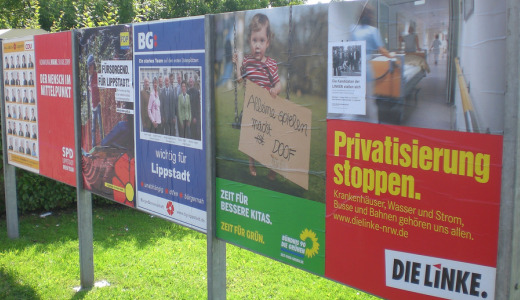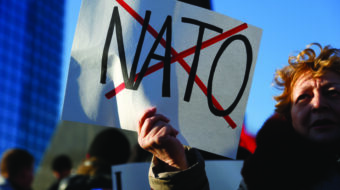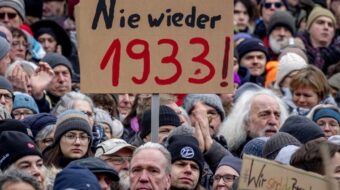
BERLIN (May 7) – Pity poor Angela! The rock is Greece and its economic woes. The hard place is North Rhine-Westphalia, Germany’s largest state, where an extremely crucial election is due on May 9. And Germany’s Chancellor Merkel is caught directly in the middle!
Europe and the world have been waiting for Germany to commit to aiding the Greek economy before it slips into total bankruptcy. It needs a big dose of financial support, and with its credit rating plummeting, it needs it fast. Much of the credit must come from Germany, economically the strongest country in Europe. The original sum in discussion was 8 billion Euros, but it is now clear that this would only be a small down payment. Every delay could unsettle the whole Euro zone, encompassing much of Europe and even affecting markets as distant as Hong Kong and Wall Street.
But Angela Merkel, despite years of heart-moving support for the European Union, has thus far done nothing but invent excuses and conditions for aid, none of them convincing. Her tactics became so disastrous that the top leaders of the World Bank, the International Monetary Fund and the European Bank visited Berlin to appeal to her. The economic calamity which has befallen Greece now threatens Portugal, Spain, maybe even Ireland and other countries, but Merkel remains adamant.
The solution to this mystery is that election on May 9. Most of the German media have been waging a merciless war of words, saying that the Greeks were lazy, received much too high pensions, and Germany had better not throw its money to that useless, coddled bunch. Few of the media made clear that foreign banks, not least of all the Deutsche Bank and Goldman Sachs, helped push the Greek government into the mess it is in. The media bashing has been directed mostly at the working people of Greece, now fighting in the streets to maintain a halfway decent livelihood. What “Bild”, for example, never says is that if the European Union, with the current right-wing German government in the lead, can force down working conditions and living standards in Greece, this could make it more attractive to run-away German companies. It could certainly lead to more unemployment and worse living standards all over Europe, including Germany.
The coming election will not only be crucial because North Rhine-Westphalia is the largest German state in population, with 18 million of Germany’s 82 million people. Once the main industrial region, with Ruhr Valley coal and steel, it is currently a rust belt, rivaled in economic troubles only by the five East German states.
For decades it was a bastion of the Social Democrats, but in 2005, thanks to the abandonment by Gerhard Schroeder’s national government of most social welfare policies, they were ousted by Merkel’s Christian Democrats (CDU), and the pro-business Free Democratic Party (FDP), the same duo which now rules nationally. But the CDU was caught up in too many scandals, while the Free Democrats kept losing ground, especially after their boss in Berlin, Foreign Minister Westerwelle, implied that workers on jobless insurance were parasites.
The chances for a renewed coalition of the two right-wing parties do not look rosy. A loss would be painfully embarrassing; the same two parties now run the federal government in Berlin. Worse yet, a loss in North Rhine-Westphalia would cost the government its majority.
The media have misrepresented the credit, implying it would be a multi-billion-Euro gift to unworthy Greece (it would actually be repayable at a high interest rate). But inflamed nationalist passions could mean losing even more votes. So Merkel has tried to wait with the money until May 9.
The elections are crucial to all the parties. The Free Democrats won an unprecedented 14 percent of the vote last year. But the hangover has dropped it back down and a serious loss on May 9 would severely cut its new-found anti-social haughtiness. The Social Democrats, who suffered a crushing defeat in last year’s federal elections, dream of a comeback. Like their favorite partners the Greens, their defeat inspires them to speak out once again from the left side of their mouth, hoping that voters will forget their sell-out when they held power. They skirt carefully around the Greek issue.
For the Left Party (Die Linke), too, the vote is very crucial. If it wins 5 percent or more it will get seats in the legislature of Germany’s largest state, greatly expanding its influence in the west. Its hopes and fears may also explain why it too has seemingly avoided much stress on the Greek question. It, too, may have decided to let Angela face the music.
If the Left does make it into the legislature it will mean reshuffling lots of cards. The CDU and the FDP will hardly have enough to keep their present majority. The Social Democrats and Greens would love to return to their old power-sharing combination, but 50 percent is no easy goal for them either. Joining with the Left would seem natural, but red-baiting frightens the Social Democrats. Since the Greens reject joining either the Free Democrats or the Left, this could mean that the Greens join with the Christian Democrats, another move towards total sell-out.
The old Rhine River faces days of great suspense. It is sad that those who are at the very bottom will most likely be people living far away, at the sun-baked Mediterranean shores of in Greece. To their credit, they have been fighting back, hard!
Photo: “Stop privatization,” a German Left Party poster says. http://www.flickr.com/photos/hailippe/ / CC BY 2.0

MOST POPULAR TODAY

High Court essentially bans demonstrations, freedom of assembly in Deep South

Zionist organizations leading campaign to stop ceasefire resolutions in D.C. area


U.S. imperialism’s ‘ironclad’ support for Israel increases fascist danger at home

UN warns that Israel is still blocking humanitarian aid to Gaza






Comments